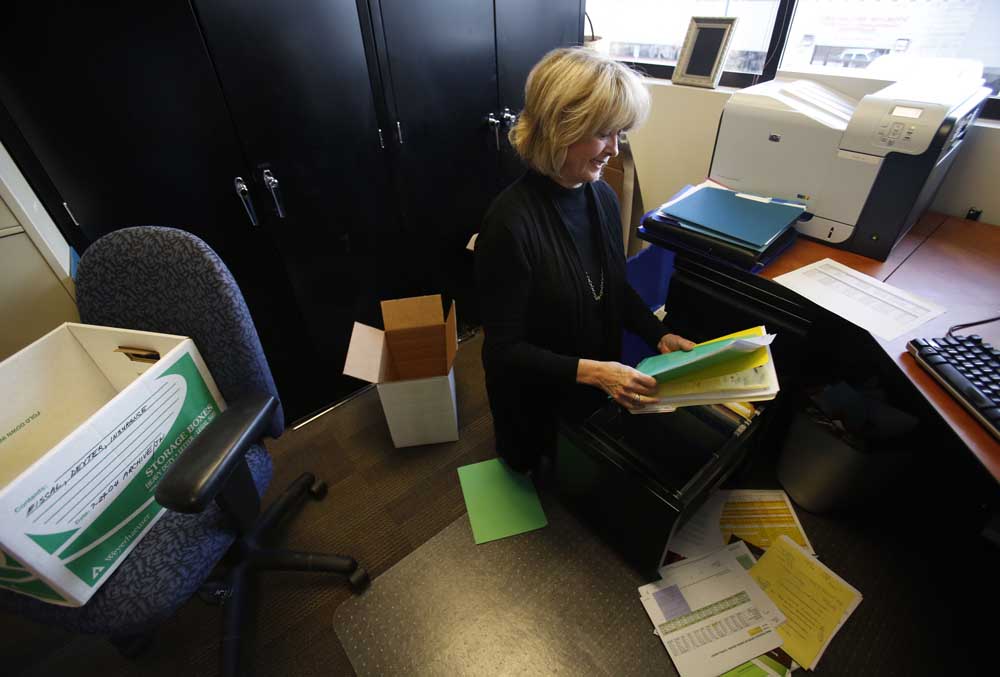Bend nonprofit teaches parents
Published 12:00 am Friday, March 14, 2014

- Joe Kline / The Bulletin Vicki Ertle, outgoing executive director of the Family Resource Center in Bend, clears out some files from her desk on her last day after 22 years in the position.
Because kids don’t come with instructions.
It’s a simple statement the Family Resource Center uses to describe its mission.
The local nonprofit, the seeds of which developed in the mid-1980s, is dedicated to helping parents be better parents. Primarily, the group offers low-cost parenting classes throughout the region.
While the FRC has been a stalwart in the community, relatively unchanged, during the past two decades, it is now undergoing a large shift. Longtime Executive Director Vicki Ertle has stepped down after having worked for the nonprofit for the past 22 years. Chuck Keers is taking her place as the head of the organization.
For Ertle, the decision to step down felt logical. The nonprofit was in a fairly stable place with a strong board and a “good foundation to pass to someone else. … It’s time to see what a new director would do.”
The beginning
After a series of teenager deaths in Central Oregon in the mid-1980s, many community members wanted to do something. “It was a call to action for a lot of people,” said Ertle. After a series of community meetings, eventually the Family Resource Center sprang into existence.
Ertle began volunteering for the group in its early days, in 1990. The mission of the group was to offer parents a place to go for help. The nonprofit filled a specific need and niche. The group primarily has two functions: offering parenting classes and helping parents connect with resources.
The group publishes a book each year, categorizing and describing resources available in the community — where to get rent assistance, food and clothing as well as listing support groups and much more.
“We tell people where to go for help,” said Ertle. The goal, she said, is to focus on prevention. Now, the FRC is also the local hub for the 211 service, which people can call to get connected to services. The group helped connect 10,592 people through 211 during 2012-13.
The other primary service FRC provides is parenting classes. The group currently offers a rotating collection of nine research-based classes as well as a handful of workshops.
Ertle says the goal has always been to remove barriers for families to attend. That means every class includes dinner and child care. “You’ve got to eat to think; I don’t think we’ll go back on that,” said Ertle. The classes are also offered at a low cost, usually about $20-$35 for a 5- to 10-week session and scholarships are available. The group’s cost for putting on a class is $2,000-$5,000.
“We want the community norm to be taking parenting classes,” said Ertle. Last year the group offered 21 classes; the nonprofit has held 339 classes since the its inception. The classes are taught by one of several dozen professionals in the community who are trained by FRC.
While subjects change — for instance, bullying and texting have been added as topics — core issues remain the same. Parents want help with communication, age-appropriate discipline, showing love and affection, and supervision, among other things, according to Ertle.
One relatively new class, called the ABCs of Parenting, is aimed at parents with children who are about to enter kindergarten or have just entered kindergarten. The goal is to help ensure that children are ready for school. “It’s a huge issue to get kids emotionally and cognitively ready for kindergarten,” said Ertle.
While parents learn about a variety of parenting techniques, the children are visiting a nearby kindergarten classroom, singing songs and experiencing the school setting. “At the end, the children perform what they’ve learned for parents,” said Ertle.
One element the nonprofit has worked on is ensuring the children receive good care during the program.
Users
People sign up for a parenting class because they are experiencing challenges, says Ertle. “They are being challenged by their kid’s behavior.”
The group has special programs for teen parents, as well as for people who are referred by the court system.
But for the most part, Ertle says, the parents are fairly typical and cross socioeconomic and education boundaries. Many come after hearing from a friend who enjoyed the classes. Others hear the class may be helpful from a school counselor, public health official or the Women, Infants, and Children program (WIC). But people who take the classes, Ertle says, should not be in crisis — these classes are for ongoing issues, not for emergencies.
Many of the issues facing parents include sibling rivalry, conflict at bedtime, tantrums, defiance and more. Ertle says some parents are struggling to balance the needs of two or more children at different ages.
The group setting can be enormously beneficial. “They learn they are not alone,” said Ertle.
Other skills parents learn, she says, are to slow down, to take care of themselves and to get down and talk on the kid’s level.
With adolescents, the big issues include peer pressure and a feeling on the parent’s part that the child is breaking away from the family.
Future
Keers comes to the FRC most recently from Beaverton, where he was the executive director for Oregon Youth Soccer. Previously he worked at a large-scale nonprofit, the Episcopal Community Center, and before that with a home for runaways. Although he enjoyed his tenure working in the world of youth sports and seeing the positive social impact that activity has on children, he is excited to be back, as he calls it, “in real social service with the values and spirit of collaboration versus the competitive environment of youth soccer.”
His goal is to help create a new strategic plan and to increase funding.
“My responsibility (is) to take what has been built and not just sustain it but to help it grow,” said Keers. “There (is) a lot of opportunity to grow what we do.”
For now, that is unlikely to include expanding the nonprofit’s mission.
The annual budget for the FRC is about $350,000. The funding comes from private donations as well as private and public grants. The overall budget, Keers says, has shrunk by about 20 percent in recent years.
There are a few things Ertle feels she left undone. She would have liked to have seen a more informal drop-in, topic-based group develop, almost like a book club. She also wishes FRC could have created an ongoing dads group. But overall she feels a sense of accomplishment and happiness with her career.
“We continue to do good work, and what we do is important,” said Ertle. “I’ve just loved this job. How many jobs let you learn about parenting and get paid for it?”
— Reporter: 541-617-7860, ajohnson@bendbulletin.com






